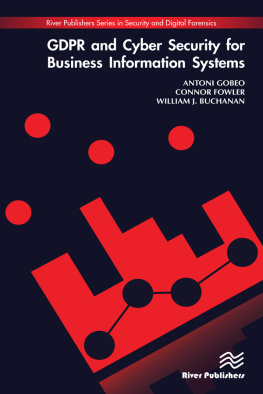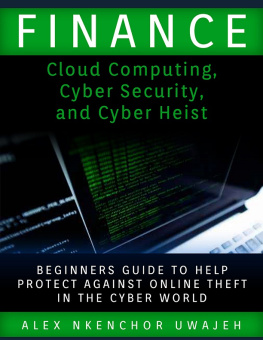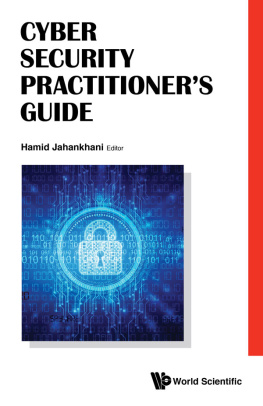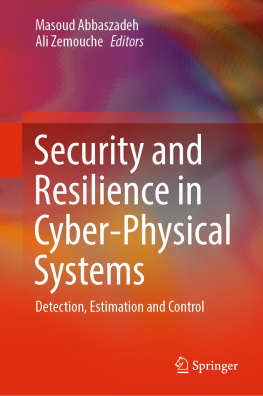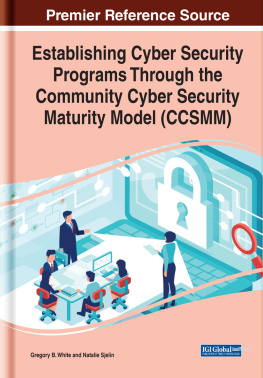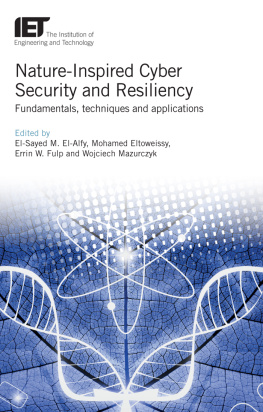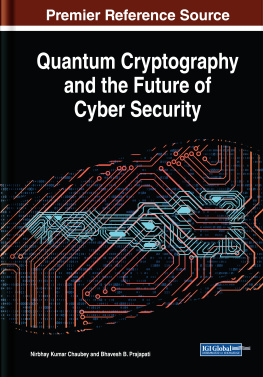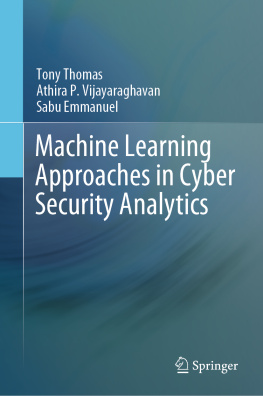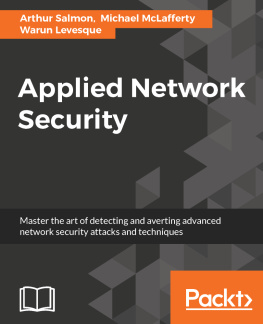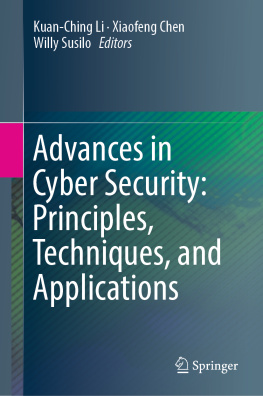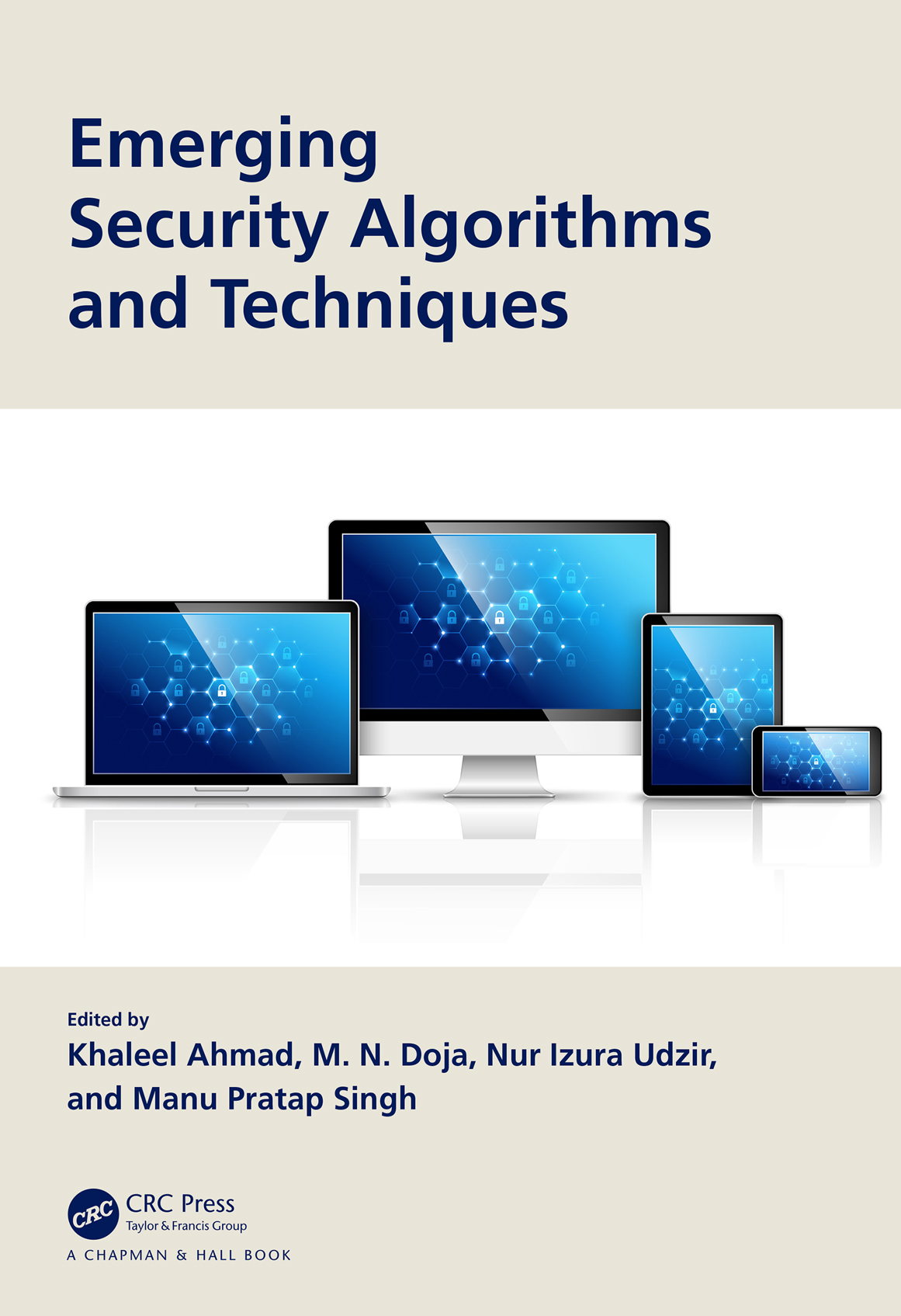Contents
Landmarks
Emerging Security
Algorithms and Techniques
Emerging Security
Algorithms and Techniques
Edited by
Khaleel Ahmad, M. N. Doja,
Nur Izura Udzir, and Manu Pratap Singh

CRC Press
Taylor & Francis Group
52 Vanderbilt Avenue,
New York, NY 10017
2019 by Taylor & Francis Group, LLC
CRC Press is an imprint of Taylor & Francis Group, an Informa business
No claim to original U.S. Government works
Printed on acid-free paper
International Standard Book Number-13: 978-0-8153-6145-9 (Hardback)
This book contains information obtained from authentic and highly regarded sources. Reasonable efforts have been made to publish reliable data and information, but the author and publisher cannot assume responsibility for the validity of all materials or the consequences of their use. The authors and publishers have attempted to trace the copyright holders of all material reproduced in this publication and apologize to copyright holders if permission to publish in this form has not been obtained. If any copyright material has not been acknowledged please write and let us know so we may rectify in any future reprint.
Except as permitted under U.S. Copyright Law, no part of this book may be reprinted, reproduced, transmitted, or utilized in any form by any electronic, mechanical, or other means, now known or hereafter invented, including photocopying, microfilming, and recording, or in any information storage or retrieval system, without written permission from the publishers.
For permission to photocopy or use material electronically from this work, please access www.copyright.com (http://www.copyright.com/) or contact the Copyright Clearance Center, Inc. (CCC), 222 Rosewood Drive, Danvers, MA 01923, 978-750-8400. CCC is a not-for-profit organization that provides licenses and registration for a variety of users. For organizations that have been granted a photocopy license by the CCC, a separate system of payment has been arranged.
Trademark Notice: Product or corporate names may be trademarks or registered trademarks, and are used only for identification and explanation without intent to infringe.
Library of Congress CataloginginPublication Data
Names: Ahmad, Khaleel, editor.
Title: Emerging security algorithms and techniques / editors, Khaleel Ahmad,
M.N. Doja, Nur Izura Udzir, Manu Pratap Singh.
Description: Boca Raton : Taylor & Francis, a CRC title, part of the Taylor &
Francis imprint, a member of the Taylor & Francis Group, the academic
division of T&F Informa, plc, 2019. | Includes bibliographical references
and index.
Identifiers: LCCN 2019010556 | ISBN 9780815361459 (hardback : acid-free paper) |
ISBN 9781351021708 (ebook)
Subjects: LCSH: Computer security. | Data encryption (Computer science) |
Cryptography.
Classification: LCC QA76.9.A25 E466 2019 | DDC 005.8dc23
LC record available at https://lccn.loc.gov/2019010556
Visit the Taylor & Francis Web site at
http://www.taylorandfrancis.com
and the CRC Press Web site at
http://www.crcpress.com
Security is pervasive. It is estimated that 3.3 billion mobile phone users are registered worldwide, which is more than half of the global population. Most of the mobile phones are built-in with Bluetooth, Wi-Fi, cameras, sensors, and many other components. Hence, digital security is no longer limited to the scholarly community but is now the concern of all users of computers worldwide. As e-commerce and electronic transactions have grown exponentially, the development of secure systems has also increased rapidly to protect the digital world against adversaries, giving rise to a vast number of applications of emerging security algorithms, and more applications are developing in proportion to the increasing development and usage of smartphone technology, online banking, m-commerce, share market, cloud computing, etc.
This book covers symmetric, asymmetric and post-quantum cryptography algorithms, and their modern applications in developing secure systems, viz. digital signature, entity authentication, message authentication, cyber security, web security, cloud security, smart card technology, and CAPTCHA. The book has been structured well with simple explanations and illustrations. In other words, this book is designed to support students who are studying computer science and engineering, information technology, electronics and telecommunication engineering at undergraduate and postgraduate levels and teachers, researchers, scientists and engineers who are working in the field of digital security. This book is written with aims to bring out a new paradigm for learning emerging security algorithms and techniques.
This book is organized into 17 chapters. Each chapter covers the following important topics in brief: modular arithmetic, finite fields, prime numbers, discrete logarithm problems, integer factorization problems, symmetric algorithms, asymmetric algorithms, post-quantum cryptography, identity-based encryption, attribute-based encryption, key management, entity authentication, message authentication, digital signatures, applications, and hands-on SageMath.
Dr. Khaleel Ahmad is currently an assistant professor in the Department of Computer Science & Information Technology at Maulana Azad National Urdu University, Hyderabad, with over 6 years of experience in Academic and Research. He holds a PhD in computer science & engineering and M.Tech. in information security. His research interests include opportunistic network, information security, and cryptography. He has successfully completed a project of INR 1.05 lakh. He has supervised five M.Tech. dissertations and two PhDs under progress. He has published a total of 35 papers in refereed journals and conferences (viz. Elsevier, ACM, IEEE, and Springer), including 14 book chapters (Taylor & Francis Group, IGI Global). He has edited a book published by CRC Press/Taylor & Francis Group and Proceeding of International Conference published by McGraw Hill. He has authored a book titled Secure Communication in Opponents Using ECC published by Lap Lambert Academic Publishing. He has delivered guest lectures at the Central University of Haryana, India, and Telangana University, India. He has also chaired the technical sessions at an international conference in Malaysia and India. He is also a life member of various international/national research societies such as ISTE, CRSI, ISCA, IACSIT (Singapore), IAENG (Hong Kong), IARCS, and ISOC (USA). Besides this, he also serves as an editorial and review board member for several international research organizations.
Dr. M. N. Doja is currently a professor in the Department of Computer Engineering at Jamia Millia Islamia (A Central University), New Delhi, India. In addition, he is also the Honorary Director of FTK-Centre for Information Technology Jamia Millia Islamia (A Central University). He is the founder and first head of the Department of Computer Engineering. He has a total of 33 years of experience in teaching and 3 years in industry. He has been nominated as Chief Information Security by Ministry of Electronics & Information Technology, Government of India, and Nodal Officer of Digital India. He was chairman and member of a number of committees constituted by UGC, MHRD, AICTE, other universities, and other external agencies. He has completed a successful project of INR 65 lakhs and other projects of INR 8.74 crore and INR 40 lakhs are ongoing. His research interests include mobile ad hoc network, information security, computer network, and soft computing. He has supervised 16 PhDs and 8 PhDs under progress. He has filed a patent titled Method to Select Sext Best Mobility Anchor Point (MAP) before Band Off Process Reducing Handoff Latency vide application no. 581/DEL/2009 in 2009. He has published more than 150 papers in journal and conference proceedings of international and national repute. He has published two books. He is a reviewer and editor for a number of journals of international and national repute. He has also delivered keynote speeches and expert talks, and also as invited speaker at various international conferences in India and abroad.


